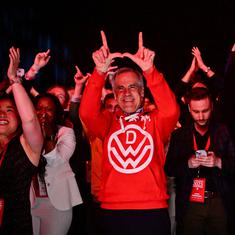One night, last April, Marta Kostyuk couldn’t fall asleep. Something stopped her eyes from shutting. It was a stray thought, a wild thought, but a thought that suggested possibility. She’d won the girls’ title at the Australian Open, so a wild card entry in the next edition to compete with the best women in the world was likely.
The realisation excited the 14-year-old’s mind: “Oh, my God, this is going to happen. Oh, my God.”
She possibly dreamt, with her eyes open, of playing the who’s who of women’s tennis, on a big court, amidst a large crowd.
But Martha stopped feeding the thought. For this little perfectionist felt she’d self-admonish if this gets registered in her mind as a goal – even if it’s “super-big” – and she fails to meet it.
Eight months later, she stood at the centre of Rod Laver Arena, embraced by the world’s No 4 player, cheered by thousands, and watched, perhaps, by over a million. The match to Elina Svitolina, she lost. But her dream, she realised.
"She's a great fighter. She always fights until the end...She has a bright future."@ElinaSvitolina, humble in victory, praising 15-year-old countrywoman @marta_kostyuk 👏#AusOpen pic.twitter.com/bDVZeL3j2z
— #AusOpen (@AustralianOpen) January 19, 2018
The fairytale at Melbourne Park
Svitolina was proud of her younger compatriot’s accomplishments at the Australian Open this year. “Winning one match in qualifying is already good. Winning two matches is, like, awesome. Three matches, passing qualifying, is something unbelievable, and then beating two girls playing good level.”
The dream run started from last year’s open, where she went on to win the girls title in three sets.
Despite in metamorphosis, her overall game’s good – a service that constantly clocks over 155 kmph, a forehand (mostly struck with the raise of her left leg) that fetches her most points, and a flat two-handed backhand that she can constantly hit deep. But to compete with – let alone beat – the senior pros isn’t something that was expected of this 15-year-old.
She stunned world No 25 Shuai Peng 6-2, 6-2, becoming the youngest winner of a main-draw match at Melbourne Park since Martina Hingis in 1996.
She extended her unbeaten run there to 11 with another straight-sets win over Australian qualifier Olivia Rogowska. She was now the youngest player to reach the third round of a Grand Slam tournament since Mirjana Lucic-Baroni’s run at the 1997 US Open.
But the great names and the big hype doesn’t seem to faze young Marta. “I beat some records or repeat them every year, so I feel okay,” she said after the match.
With the second round win, the whispers about this Ukranian grew louder, the expectations soared a little higher. But to beat an opponent ranked 517 places higher, and eight years older, was a tall order.
But to the teenager, the defeat was an opportunity to learn . “How much you have to pay Svitolina to have one-hour lesson? I got it for free.”
Many more to come for this lil champ @marta_kostyuk! Let’s keep it rolling. #last16 @AustralianOpen pic.twitter.com/kflzlEnrgp
— Elina Svitolina (@ElinaSvitolina) January 19, 2018
Records, however, are by-products for her, not the reason why she plays tennis. She took up the sport because of her mom. And, if it wasn’t for her, she wouldn’t have turned up for the Australian Open.
Mom’s girl
Marta’s mother, Talina Beiko, played on tour and reached a career-high ranking of No.391 in 1994. Talina’s hectic schedules of coaching assignments didn’t allow little Marta to be with her mom. So, she, too, picked up a racquet and practiced with her mother.
But she didn’t like the sport much. Errors irked her. Mishits caused anger. Racquets were broken. Being a perfectionist was painful.
Two years ago, she thought of quitting. She’d just won a Grade I Under-14 tournament. “I was like ‘Oh, I’m a superstar.’ Then, an ITF Grade 5 tournament: second-round loss. Grade I Under-16 tournament: second-round loss. Racquets: broken. Morale: shattered. She told her mom that she can’t take it anymore.
But Talina willed her daughter on. She put the racquet back in her hand. She broke one again. Talina chided her for it, but asked her to persist.
Then, Martha realised what she did wrong.
“I was thinking that I was playing tennis for nine years and just because I lost two matches, I walk away? That makes no sense,” she told wtatennis.com. “I realised,you’re not addicted, but you’re becoming addicted to the emotions and to the work.”
In the three qualifying matches, she kept her emotions under check and was able to move on to the next point without much self-flagellation.
“Now I’m starting to realise how it is to not show emotions and have all the time good energy, and I’m starting to really understand that it helps me,” she said.
Even against Svitolina, she was almost on par in the technical aspects. Mentally, though, the more experienced Ukranian was superior.
In case you missed it, here is a summary of the match between #Svitolina & #Kostyuk. The clear difference was the ability to execute when it counted (i.e., clutch index). Well played @ElinaSvitolina ! 👏👏 pic.twitter.com/rqri6YyUOp
— TennisAustraliaGIG (@TennisAusGIG) January 19, 2018
But Marta’s just 15. With her mom, coach, and manager Ivan Ljubicic (who also works with Roger Federer), she isn’t lacking in guidance. With every win, she will boost her confidence. With every defeat, she will learn lessons. Marta’s isn’t a fairytale that has ended at the Australian Open, it looks like a story that has the potential to be a legend.
More about Marta
Most-used app: Whatsapp
Favourite social media platform: Instagram
Favourite food: Italian
Training place: Zagreb
Idol: No one. But she wanted to marry Novak Djokovic.










